Alfonso’s story
Sometimes I sit on the patio at our home in the desert and I watch the ants. They march in their long lines like some super freeway across the rocks and arroyos. When a few ants are crushed and dead, the rest keep marching right over their bodies. There doesn’t seem to be an awareness of losing a comrade ant. The march goes on. It seems there is no consciousness of life or death with ants. I’ve read that elephants gather around their dead in a sort of ritual of respect. This sort of consciousness however is primarily the stuff of humans. We care. We respect life. We help those who are struggling to survive.
I try not to think about what the future holds for my migrant friends when I sit down with them at the comedor. Many are finished with this business of trekking across the desert. They are disheartened and upset, but they are figuring out how to get home to their villages in Mexico and further south. The Samaritans often buy them bus tickets.
Other migrants are noncommittal about their plans, and smile quietly as I tell them about the scorching desert and the number of liters of water they need to carry to survive. They are being polite. They don’t hear a word. There is a veil over their eyes as I speak to them about the dangers, the Border Patrol, the long distances. They search for decent shoes and backpacks in our piles of clothes and supplies. Many wear large crosses around their necks. The men thank me and are unfailingly polite. Then they are gone.
On one particular morning (April 17, 2012) I notice a man limping and looking at the shipment of new shoes that the Samaritans brought for distribution. The man has both feet bound in gauze bandages, and still there are blisters visible. We find him some oversized slippers to wear. I sit down with this gentleman and learn that he is from Vista, California, and has a wife and five children. They live with him in his American home. His English is excellent. His name is Alfonso, and he is a butcher who has lived in Vista for twenty years. He lost his job two years ago because of his immigration status, so he has been busy with odd jobs here and there in his community. He gets by.
Alfonso was picked up at a store in Vista in March because of a series of flukes and obtuse circumstances. He was minding the store for a few minutes while the owner, a friend, stepped out. He was not an employee, but was doing his friend a favor for a short while. A deputy entered the store and asked for his identification. Alfonso had his Mexican identification card, but no other papers.
He was deported to Tijuana, Mexico and after trying to return to Vista and his family, he was picked up again, spent some time in detention, and was deported to Nogales. Now he is here at the comedor thinking over his options. He is profoundly depressed and worried about his family. Privately I think to myself, this man will not be walking in the desert in the near future. His feet are too macerated. At least he will be safe here for awhile. I feel some relief that he will not be hiking across the Sonoran desert. The temperatures are rising and we are heading into a very hot early summer. I ask him if it is possible for his family to come here, rather than for him to try to cross again and travel to Vista. He does not think this is possible.
So we part ways as I often do with the migrants and I wish him a safe journey wherever he is going. I check his feet and ask to photograph them, and he tells me this is OK. He is slumped over sitting at the long tables, and his eyes are a million miles away.
In the coming weeks I went on some desert searches with Samaritans. Packing up the van with medical supplies, water, food packs and clothing, we set off into some of the back country where there are known migrant trails. The country is vast and beautiful during the late spring with the color of blooming cacti and the soaring of migrating birds distracting us from the job at hand. Birds migrate, people migrate, butterflies migrate—Arizona is a crossroads for living things on the move. We are a nation of nomads. The temperatures reach into the 90’s and begin to creep into triple digits. It is 85 degrees at 9 AM and climbing. The Border Patrol tells us there is “a lot of activity.” We gaze through binoculars and see nothing but the birds and flowering saguaros, their white waxy flowers looking like Easter bonnets. I think about who might be out there, but see only the twisting trails up and down the mountains. The Border Patrol tells me that the migrants travel at night and you can see their flashlights in long ribbons dotting the desert. It looks like an LA freeway.
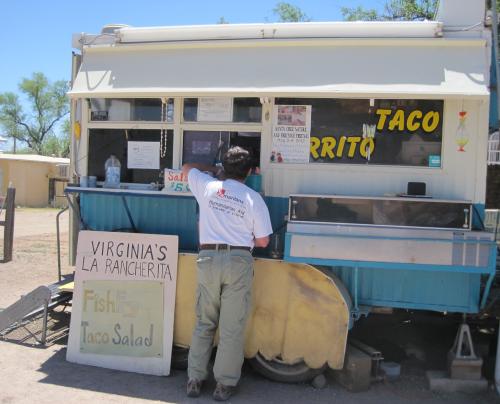 Lunch in Arivaca, Arizona after a desert search
Lunch in Arivaca, Arizona after a desert search
On April 20, three days after my encounter with Alfonso, he began his journey in the desert. How he was able to walk even a mile astounds me. He lasted one day, and was left by his coyote guide because he was holding back the rest of the group. His friend, Isaac, stayed with him and found Alfonso’s cell phone in his pocket. He called 911 but had no reception. The pair was somewhere on the Tohono O’odham reservation, a vast expanse of desert with few people. Walking for two hours, Isaac was finally able to reach the Border Patrol who came and picked him up. He was immediately arrested. Isaac begged the officers to return to his friend, Alfonso, who was sick and unable to walk. Isaac knew exactly where he was. The Border Patrol said they would “send out another agent” to look for the injured Alfonso.
And this is the point in the story where I have a basic disconnect. Isaac knew where to find Alfonso, and could do so within two hours. The Border Patrol agent did not know where to find Alfonso. It is basic human decency to search for a person who is unable to walk and in danger of dying in the Sonoran desert. For reasons I do not understand, this did not happen.
And I think about the ants on my patio. The march goes on. The business of the Border Patrol continues without interruption.
Isaac was deported to Mexicali, Mexico, and released in two days. He immediately called Alfonso’s family, and his wife and children created an altar to her husband praying that he was still alive.
The Border Patrol after several days asked Isaac to take them to the place he had last seen Alfonso. Isaac returned to Arizona with the agents and was able to find his friend on April 26 at the base of Baboquivari, the sacred mountain of the Tohono O’odham. Alfonso had not survived. The body was in an advanced state of decomposition. It took several more days to positively identify the body in the Medical Examiner’s office.
So here is the time table:
- I meet Alfonso April 17 at el comedor and find him some slippers to wear. I examine his severely blistered feet and photograph them. We talk about his family, his home, his career as a butcher.
- Alfonso begins his journey across the desert April 20.
- He is unable to keep up April 21, and cannot go on. His friend, Isaac, stays with him. They are both abandoned by their migrant group and the coyote guide.
- Isaac contacts Border Patrol after hiking two hours and is immediately arrested. The agent refuses to look for the lost Alfonso and instead deports Isaac to Mexicali.
- Isaac is in detention for two days and upon release contacts Alfonso’s wife and family.
- Border Patrol agents ask Isaac to lead them to Alfonso.
- Isaac is able to lead the agents directly to his friend on April 26. Alfonso is dead from hypothermia, exposure and dehydration.
This story has hit me hard. It is a senseless waste of life. It is imperative that this situation be examined and the Border Patrol be held accountable. Most of the time my conversations and encounters with Border Patrol agents have been helpful and cordial. I have felt a mutual respect. They appreciate what the Samaritans do, and I am grateful that the agents are in the business of saving lives and keeping the peace. But there was no reason for this death.
The man was two hours from a rescue.
May God forgive us for allowing this sort of desperation where a man dies in the desert trying to reach his family, and we don’t have the humanity to look for him.
For further details about this tragic story, please refer to the link below:
http://www.nctimes.com/news/local/vista/article_46185bd0-3c04-5d81-b24d-7f6c99d21eed.html
For more information about what the Green Valley Samaritans do in response to the immigration crisis in the borderlands, check out our wonderful website: www.gvsamaritans.org

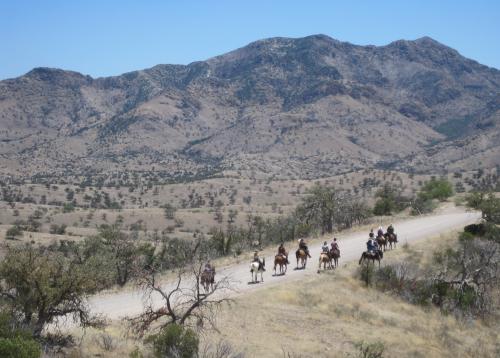
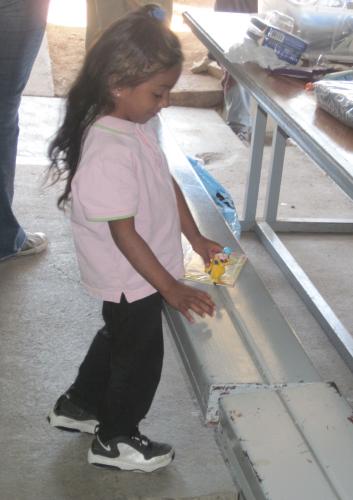
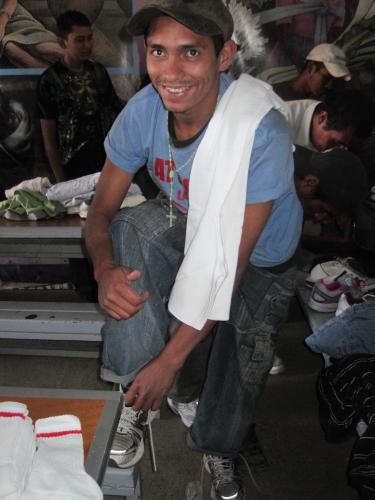
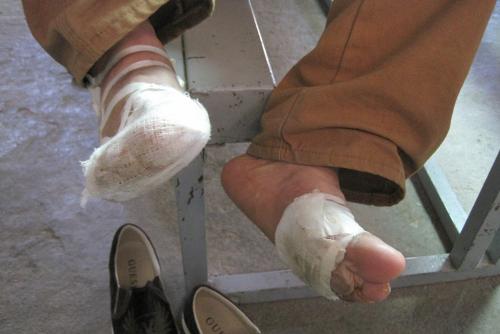
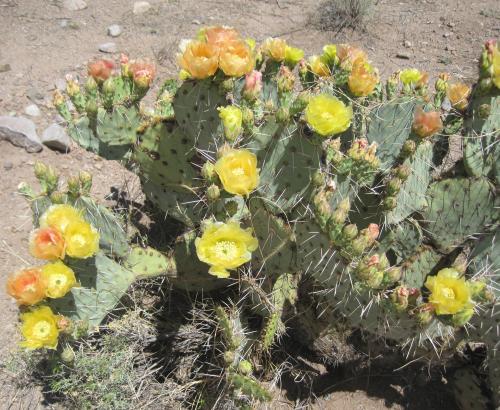
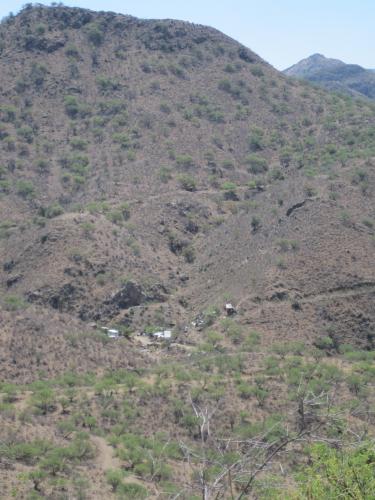
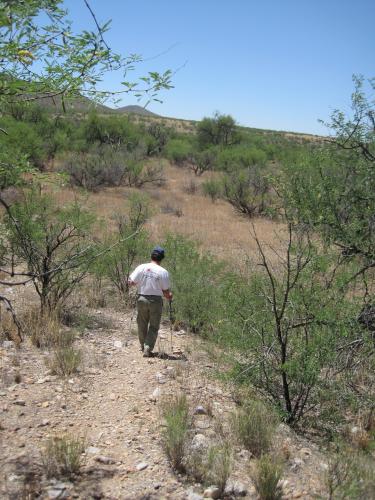
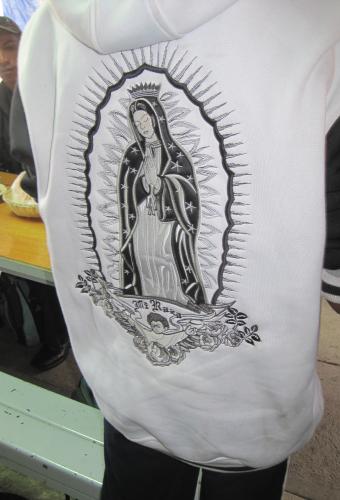
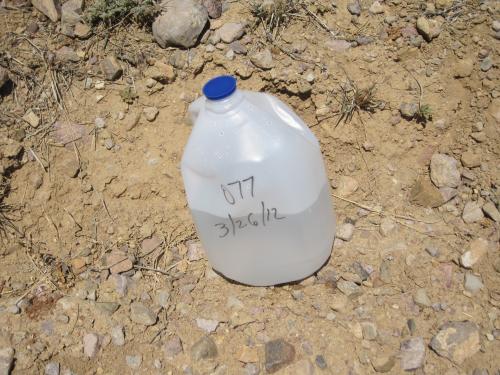

Peg,
Your May 28 entree struck me as the most beautiful, poignant, powerful, and to the point, of all. Your website with the black background and orange sunset is stunning. And I love the “Leave a comment ” option.
I ‘d like to visit the comedor and have about 30 men’s shirts I like to donate. Can I just walk across the border at Nogales and walk a mile or so (?) to the Comedor? Or do I have to make an appointment or have an escort or something?
How’s your book coming?
Tony O’Connell
Your stories, always so well-written, affect me deeply. In general you do not blame, the situation is way too many shades of gray for that. This is the truth about our current immigration policies that is so hidden.
Just heart-breaking.
And angering.
The following comment is from one of my oldest friends who lives in Texas:
A story evoking a heartfelt desire for a solution to this ugly problem. I know those that clamor for all illegals to be deported but not only do they not know of the devastation it would cause for our economy they do not know of the trials and tribulations of both physical and emotional burdens suffered by these people.
I so agree with your assessment of the needless loss of life by your acquaintance.
I am also keenly aware of what devastation it would cause to our Texas economy in that it is estimated that there are over 800,000 immigrants in Texas but only 500 or 600,000 unemployed workers in our state. That leaves over 200,000 unfilled jobs and many of the jobs these individuals perform most “American Citizens” won’t do.
Please do not interpret this to mean that I am only concerned about our economy but this is just an unconsidered consequence that would take place if the hard line people had their way.
I enjoy your blog and your writing style. Please continue to notify me of your posts.
Thanks for thinking of me
With love and respect
Joel
emtpjoel@aol.com